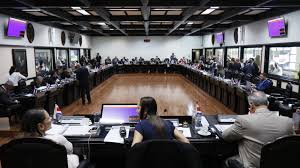
Individuals and organizations that provide public or private services may refuse to take any action if they believe that it goes against their “religious principles and convictions” or “their moral beliefs”.
This says the bill “to protect the conscientious objectionand ideology“, which is processed under file 22.006 since last May 28th and this week received the approval of a new replacement text by the deputies of the Government and Administration Commission.
The initiative reopens the debate on conscientious objection and its possible limitations, as professional associations and other entities allege that it could serve as an excuse to discriminate or undermine the provision of basic services such as health.
Formal procedure
In order for objecting to reasons of conscience against any act, each person would only have to make a request in writing to their headquarters, so that they could review the reasonableness of their approach. In the case of organizations, they would only have to establish their ideologies as part of their statutes.
The bill also establishes that whoever violates the rule would be punished for the crime of racial discrimination, contemplated in article 380 of the Penal Code. It contains penalties of up to a 60-day fine, for all cases, and up to another 60-day suspension from public office, for cases of recidivism.
In the case of essential public services, the most up-to-date version of the bill – a substitute text suggested in the subcommittee report – only establishes that public institutions would have to develop “protocols” to guarantee their provision, without “violating the fundamental right of objectors”.
As indicated, the entities must ensure that the exercise of conscientious objection “does not affect in any way the efficient and effective provision” of services, but rather “guarantee (…) continuity in the immediate, uninterrupted, quality provision, and at the legally established price, of the essential public services that are their responsibility “.The costs that these indications would have in administrative terms, such as hiring, are unknown.
Diverse political opinions
The text was presented by the independent Jonathan Prendas, from the independent bloc calling itself New Republic (related to the former candidate Fabricio Alvarado, together with a significant number of other deputies.
The replacement text was approved with four votes in favor and three against in Government and Administration. The signatories of the project Jonathan Prendas, David Gurzong, Aracelly Salas and Dragos Dolanescu and; Against the ruling party Víctor Morales, the independent Zoila Volio and the liberationist Jorge Fonseca did.
Morales claimed that allowing religious and ideological objections could lead to inconvenient legal uncertainties; However, Prendas assured that conscientious objection is already recognized as a right and that this norm seeks to clarify its forms of application. The liberationist Gourzong initially said that he could not approve the bill as drafted; however, he finally approved the subcommittee report.
The deputies will now carry out a new round of consultations with government ministries, state institutions, associations and religious representatives. Meanwhile, the text will continue on its way forward. Then the Legislative will be in charge of ruling it positively or negatively.
Conscientious objection for religious reasons is also promoted from different political. In fact, several of them promote it as part of another initiative ( “Freedom of Worship”). This initiative would also allow churches to access state donations for their “religious purposes” and to directly manage addiction recovery centers, public soup kitchens, educational and cultural institutions, health centers, hospitals, the media, publishing houses or community service entities.
Criteria against the bill
According to the subcommittee report of the conscientious objection project, the initiative had negative criteria from the College of Pharmacists, the College of Social Workers and the National Institute for Women (Inamu). Likewise, major negative observations were made by the College of Psychologists, the College of Criminology and the College of Physicians and Surgeons.
The College of Social Workers even pointed out that the text is a “setback” and that it “threatens the gains derived from social struggles, under an alleged argument of protection of individual principles, beliefs and convictions, which minimizes the model of social inclusion and human rights”.
For its part, the College of Surgeons affirmed that the rights of equality and non-discrimination are being violated, and added concerns about the confusing and lax wording of the initiative.

